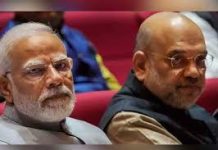 The Election Commission has told the Supreme Court of India that political parties should not give the tickets to candidates with criminal antecedents. Time has come for the political parties to raise the bar by not allowing candidates with proven criminal credentials to contest elections.
The Election Commission has told the Supreme Court of India that political parties should not give the tickets to candidates with criminal antecedents. Time has come for the political parties to raise the bar by not allowing candidates with proven criminal credentials to contest elections.
This becomes imperative because a large number of candidates with criminal cases pending against them contest elections and criminalize the entire process. The report of Association for Democratic Reforms and National Election Watch is an eye opener.
In 2019 Lok Sabha election, out of the 7,928 candidates who contested election, 1500 (19 per cent) candidates had declared criminal cases against themselves. And mind it this has been continuing election after election. Out of 8,205 candidates analyzed during Lok Sabha elections in 2014, 1404 (17 per cent) candidates had declared criminal cases against themselves. This shows that the number of candidates with criminal background had instead increased. Out of 7810 candidates analysed during Lok Sabha elections in 2009, 1158(15 per cent) candidates had declared criminal cases against themselves.
And mind it these criminal cases are very serious cases. The ADR report found that1070 (13 per cent) candidates who contested in Lok Sabha 2019 elections had declared serious criminal cases including cases related to rape, murder, attempt to murder, kidnapping, crimes against women etc. Out of 8205 candidates analysed during Lok Sabha elections in 2014, 908(11 per cent) candidates had declared serious criminal cases against themselves. Out of 7810 candidates analysed during Lok Sabha elections in 2009, 608(8 per cent) candidates had declared serious criminal cases against themselves. This shows that during 2009 elections, 8 per cent candidates had serious nature criminal cases against them, the number went up to 11 per cent during 2014 elections and to 13 per cent in 2019 elections. This is alarming trend.
Data further exposes candidates with declared convicted cases. As many as 56 candidates had declared in their affidavits sworn by them that they had been convicted in criminal cases against them. The candidates with cases related to murder were 55 against whom conviction was in murder cases under Indian Penal Code 302.
There were 184 candidates with cases related to Attempt to Murder under IPC Section-307. Candidates with cases related to crimes against women were 126 candidates. Shockingly, nine out of 126 candidates had declared cases related to rape (IPC Section-376). There were 47 candidates with cases related to kidnapping. Similarly there were 95 candidates with cases related to Hate Speech.
Party wise Candidates with Criminal Cases: 175 (40 per cent) out of 433 candidates from BJP, 164 (39 per cent) out of 419 candidates from INC, 85 (22 per cent) out of 381 candidates from BSP, 40(58 per cent) out of 69 candidates fielded by CPI(M) and 400 (12 per cent) out of 3370 Independent candidates have declared criminal cases against themselves in their affidavits.
Party wise Candidates with Serious Criminal Cases: 124 (29 per cent) out of 433 candidates from BJP, 107 (26 per cent) out of 419 candidates from INC, 61 (16 per cent) out of 381 candidates from BSP, 24(35 per cent) out of 69 candidates fielded by CPI(M) and 292 (9 per cent) out of 3370 Independent candidates have declared criminal cases against themselves in their affidavits. Not only this growing money power is another ill that is there to be seen during elections.
The average of assets per candidate contesting in the Lok Sabha Elections 2019 was 4.14 crore. Party wise average assets: Among major parties, the average assets per candidate for 433 BJP candidates is 13.37 crores, 419 INC candidates have average assets of Rs 19.92 crores, 381 BSP candidates have average assets worth 3.86 crores, 69 CPI(M) candidates have average assets worth 1.28 crore, and 3370 Independent candidates have average assets of 1.25 crores.
A yet another cause of worry is that a large number of semi-literate or illiterate candidates make it to elections.
Education details of candidates: 3477 (44 per cent) candidates had declared their educational qualification to be between 5 th pass and 12th pass, while 3808 (48 per cent) candidates have declared having an educational qualification of graduate and above. 253 candidates have declared themselves to be just literate and 163 candidates are Illiterate.
However, candidates with criminal antecedents entering Parliament or State Assemblies are a matter of concern. The Election Commission told the Supreme Court that its 2018 direction asking poll candidates to declare their criminal antecedents in the media has not helped curb criminalization of politics. It then suggested that political parties should be asked not to give tickets to those with criminal background.
A bench of Justices R F Nariman and S Ravindra Bhat has asked the Election Commission (EC) to come up with a framework within one week, which can help curb criminalization of politics in nation’s interest. It asked the advocate-petitioner Ashiwini Upadhyay and the EC to sit together and come up with suggestions which would help curb criminalization of politics.
It may be recalled that in September 2018, a five-judge Constitution bench had unanimously held that all candidates will have to declare their criminal antecedents to the EC before contesting polls and called for a wider publicity, through print and electronic media about antecedents of candidates. On October 10, 2018, the EC had issued notification regarding the amended Form-26 and directions to political parties and candidates for publication of criminal antecedents.
However, the plea filed by Upadhyay alleged that the EC neither amended the Election Symbol Order, 1968 nor the model code of conduct (MCC) so the said notification has no legal sanction.
The poll panel suggested that instead of asking candidates to declare criminal antecedents in the media, political parties should be asked not to give tickets to candidates with criminal background. Now the poll panel has been asked to suggest a framework after the court was told that its 2018 directions had not helped in checking criminalization of politics. The SC had then refused to bar politicians with pending criminal charges from contesting elections, urging Parliament to reconsider such disqualification.
Under the Representation of the People Act, convicted politicians are disqualified, but not those who merely stand accused. The poll panel had observed that corrupt practices arise when ‘power is married to money’. It is time political parties come forward and dissuade candidates with criminal background from contesting elections.
letters@tehelka.com











